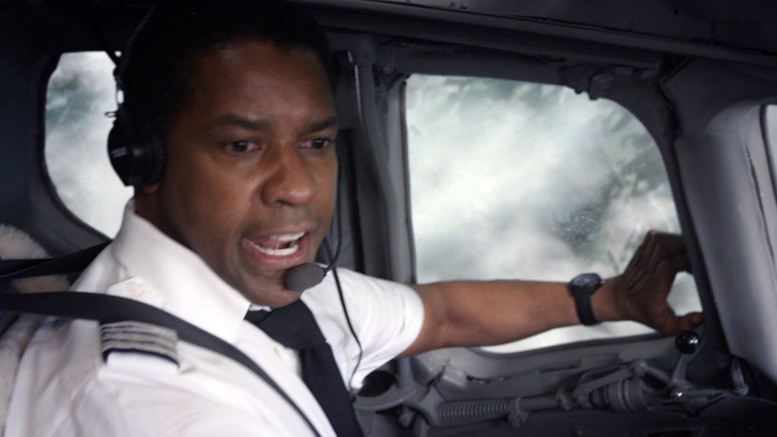Over twelve years since helming his last live-action film Cast Away, director Robert Zemeckis has decided to mark his comeback to film-making with a bang courtesy of his new drama Flight. Having dealt with Delorean time-machines, cartoon rabbits and autistic heroes in his previous productions, Zemeckis takes a dark turn with his latest effort as he teams up with two time Oscar-winning actor Denzel Washington to present a film about the temptation of alcohol and how it can affect the life of its central character. While it has been done before in other alcohol-related films like The Lost Weekend (1944) and Leaving Las Vegas (1995), you can’t help but be intrigued when you know that Denzel has an Oscar nomination for it….
William “Whip” Whitaker (Denzel Washington) is a pilot who has an alcohol addiction. After spending a heavy night drinking and doing drugs, he takes charge of his latest flight despite still being in a drunken state. But when his flight starts to develop problems in the engineering department, he manages to prevent the plane from crashing thus saving the lives of nearly everyone on board. Although he is hailed a hero, the toxicology report reveals he had alcohol in his blood which leaves him in a tough predicament as he faces being investigated over the incident. As he continues to indulge himself to booze, those around him including lawyer Hugh Lang (Don Cheadle), close friend Harling Mays (John Goodman) and former drug addict-turned-new love interest Nicole (Kelly Reilly) try to support him.
As soon as the film starts, you know straight away this isn’t Zemeckis’s usual territory as we see Whip surrounded by empty beer bottles, lines of cocaine and a sexy (and naked!) Latino woman which sets the tone for what the character’s life is all about. This allows writer John Gatins (Oscar-nodded for his script) to create a narrative confrontation for viewers as they become immersed in a story of mental struggle. But for the first half-hour, the film is mostly dominated by the spectacular flight sequence which sees Whip having to handle landing the aircraft in its perilous situation. The director has always excelled when it comes to action scenes and here, it is no exception as the camera shakes uncontrollably and leaves us adrenaline-filled. It is edge-of-your-seat stuff for something so catastrophe and should only be experienced on the big-screen. But the film is not so much about the plane crash and aftermath but is more about Whip’s addiction. The highest moments of drama actually occur when confronted by the bottle whether it be at his father’s farm or a hotel room he stays at near the film’s climax. The latter environment sees him face his toughest choice of whether to drink or not even when facing an important event the following day. Most of the time, the bottle wins the war, just as it unfortunately does so with real life alcoholics. Of course, there are those who try to help him throughout the film but his nasty personality overcomes him even to the point when he gains some new romance in his life by hooking up with former drug-user Nicole. Having spent several years starring in average action-flicks, Denzel Washington manages to reclaim responsibility as one of Hollywood’s best actors with his stunning performance of a man whose addiction leaves him in a troubled state of mind. Washington is able to mix charisma, aggression and hidden trauma to his performance as he leaves his audience conflicted over whether they should support his battle to recover or loathe him for his selfish attitude. Don Cheadle and Bruce Greenwood lend effective support as the two authoritative men tasked with helping Whip in his situation but having to put up with his outrageous behaviour while John Goodman stumbles off the set of The Big Lebowski to chew scenery in his limited role as the mouthy but comical dealer. A pleasant surprise in the cast comes from British actress Kelly Reilly as she puts on an immaculate Southern accent in her role as Nicole and provides an emotional and wounded counterpoint to Denzil’s Whip.
However Zemeckis does let his guard down with the characterisation and plot structure which is what almost ruined Cast Away in its finale. Though we become fascinated by Whip, we never really find out WHY he is an alcoholic even when we get given some brief details about his family history. When we do see him confronting his ex-wife and son, it comes across as predictable for a man in his state and is a plot cliché that has been done so many times in films and television shows. This also affects the Nicole character as she makes an important contribution to the film’s first half only to disappear and then randomly pop up in a contrived manner. Audiences will also find it hard to root for Whip as he is presented as unlikeable for the majority of the film and even when we get to the important courtroom scenes, we struggle to really know whether to care about his fate.
VERDICT: Robert Zemeckis makes a worthy return to live-action films with this gritty but slightly underwhelming character study which is strengthened by an award-winning comeback from Denzil Washington and a mid-air sequence of thrilling proportions.


Be the first to comment on "Flight – ★★★"